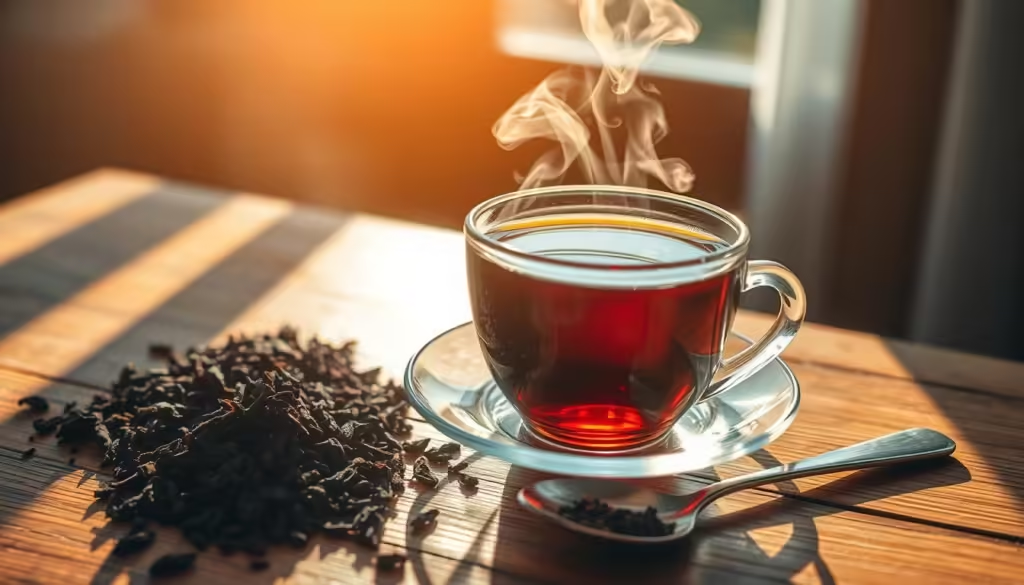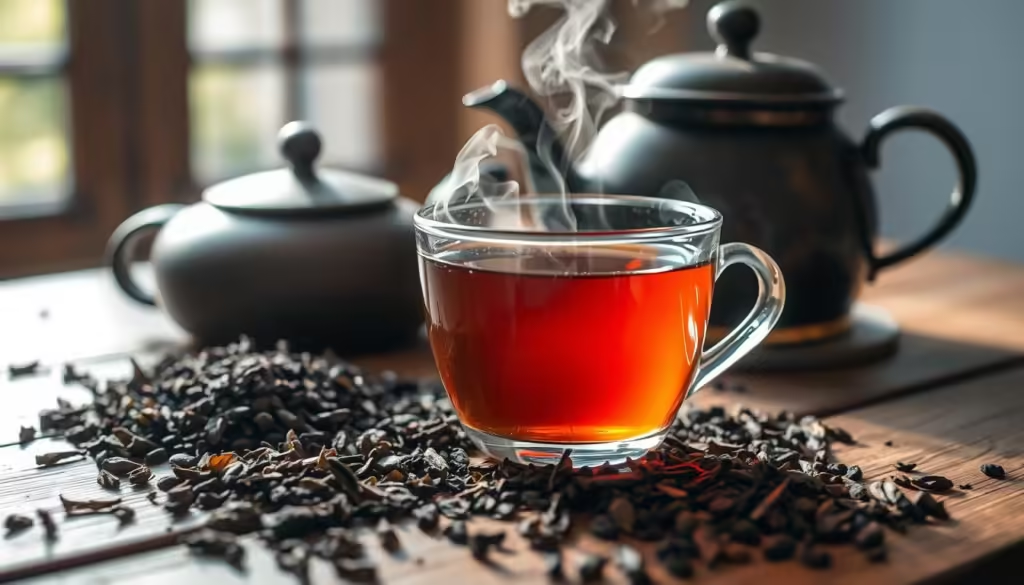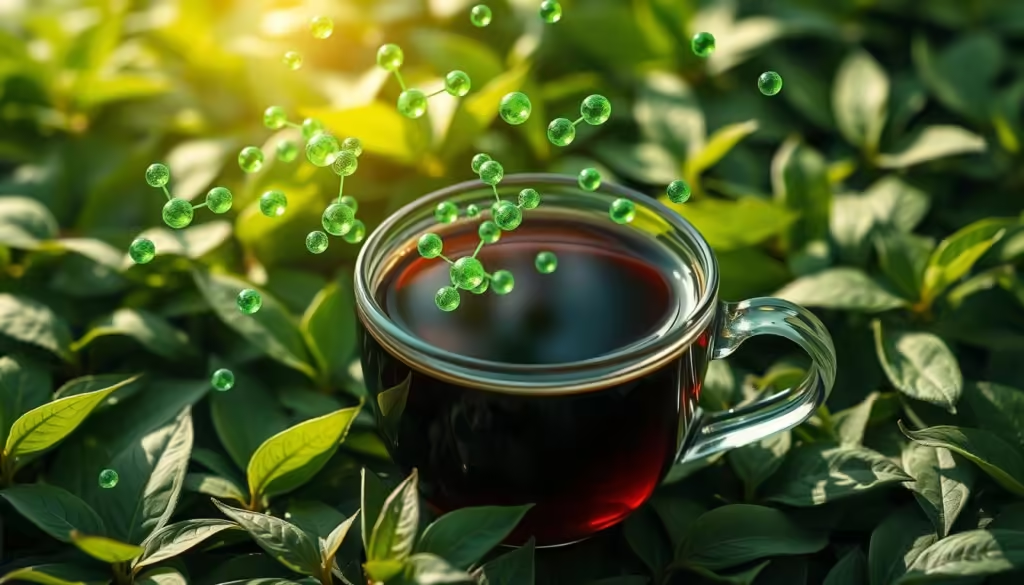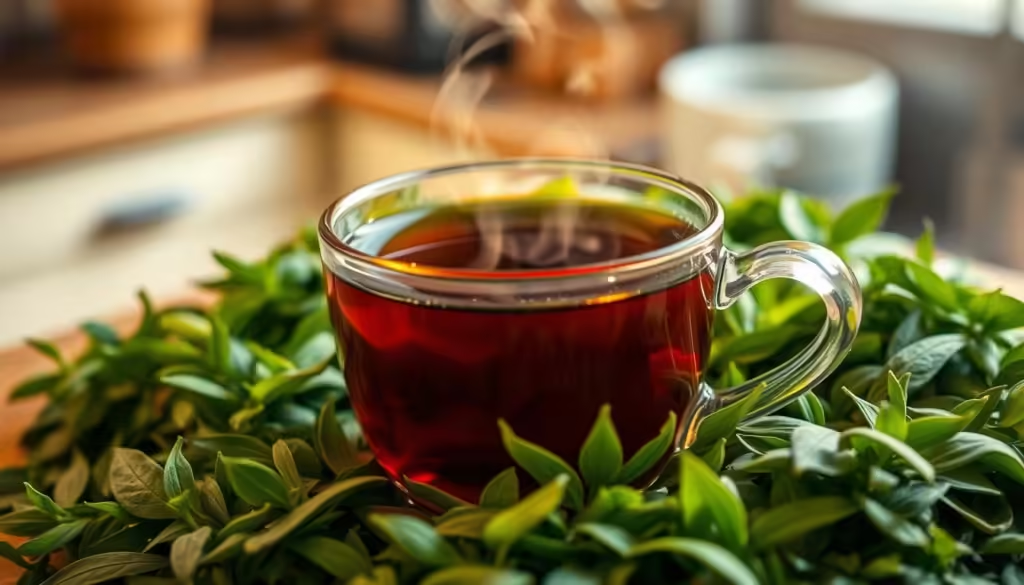
Black tea is a favorite drink around the world, enjoyed for over 5,000 years. It comes from the Camellia sinensis plant. The unique oxidation process gives black tea its special taste and health perks. It’s also known for its caffeine, which gives a nice energy boost.
The amount of caffeine in black tea changes based on where it’s from, how it’s made, and how long it’s brewed. On average, an 8-ounce cup has 47-90 milligrams of caffeine. This is less than coffee but still enough to wake you up and focus without the jitters.
Black tea also has L-theanine, an amino acid that pairs well with caffeine. Together, they help you stay calm yet alert. This combo improves your thinking and focus, making black tea a top pick for a productive energy lift.
Table of Contents
Black Tea: The Favorite Pick-Me-Up Drink

Black tea is a top choice for many, coming in second to water. Its special processing, including oxidation, makes it stand out. This method gives black tea its dark color and strong taste, loved by many.
The way black tea is made affects its caffeine and health benefits. Unlike green tea, black tea has more caffeine. But, the tannins in black tea can slow down caffeine absorption. This means black tea might not be as stimulating as coffee.
| Tea Type | Caffeine Content (per 8 oz) |
|---|---|
| Green Tea | 5 – 25 mg |
| Black Tea | 50 – 100 mg |
Many things can change how much caffeine is in tea. Things like the size of the tea leaves, how long it steeps, and the water temperature matter. Teas that are less oxidized, like green and white tea, have less caffeine than black tea.
Black tea’s unique making process and caffeine content make it a go-to for many. Its health benefits and stimulating effects keep it popular worldwide.
“Black tea is one of the most popular beverages worldwide, second only to water.”
Caffeine Content in Black Tea

Black tea is known for its caffeine kick. It has about 47 milligrams of caffeine in every 8-ounce cup. But, the amount can change from 50 to 90 milligrams, based on how long it’s brewed and the tea’s quality.
For comparison, a cup of coffee has around 95 milligrams of caffeine. So, black tea might not have as much caffeine as coffee. Yet, it still gives you a good energy boost to keep you alert and focused all day.
| Beverage | Caffeine Content (per 8oz/237mL) |
|---|---|
| Black Tea | 47-90 mg |
| Green Tea | 28 mg |
| Black Decaf Tea | 2 mg |
| Coffee | 95 mg |
| Espresso (single shot) | 58 mg |
The amount of caffeine in black tea can change. This depends on where the tea comes from, how it’s processed, and how it’s brewed. Drinking too much caffeine, especially at night, can mess with your sleep. So, it’s key to enjoy black tea in the right amount.
The Caffeine-L-Theanine Synergy

Black tea is famous for its caffeine, but it also has L-theanine, an amino acid. Together, they give a balanced energy boost. This is different from caffeine alone, which can make you jittery.
Black tea has about 17.73 mg/g of caffeine and 5.13 mg/g of L-theanine. These two work together to improve focus and calmness. This is not what you get from caffeine by itself.
L-theanine in black tea balances out caffeine’s effects. It prevents the jitters and anxiety that caffeine can cause. This makes for a steady and productive energy level.
“The combination of caffeine and L-theanine in black tea provides a unique synergistic effect, enhancing cognitive performance and concentration without the unwanted side effects.”
Studies show black tea has less L-theanine than green and oolong teas. Green tea has up to 6.56 mg/g and oolong tea has 6.09 mg/g. This makes black tea’s caffeine and L-theanine ratio perfect for focus.
Black tea’s mix of caffeine and L-theanine is special. It keeps you alert and focused all day. You won’t feel jittery or crash later. It’s a great way to stay energized.
How Much Caffeine in Black Tea?

Black tea is a favorite drink for many, thanks to its caffeine kick. But how much caffeine does it really have? The caffeine in black tea can change based on several things. These include the type of black tea, how long it’s brewed, and the size of the serving.
A typical 8-ounce (237 ml) cup of black tea usually has 47-90 mg of caffeine. But, the amount can vary from 14 mg to 70 mg per cup. This depends on the tea type and how it’s brewed. Loose leaf black teas often have more caffeine than tea bags.
| Tea Type | Caffeine Content (per 8-oz cup) |
|---|---|
| Black Tea | 47-90 mg |
| Oolong Tea | 30-40 mg |
| Green Tea | 20-30 mg |
| White Tea | 15-20 mg |
| Yerba Mate | Approximately 85 mg |
Many things can affect the caffeine in your black tea. These include where the tea comes from, how it’s processed, and your brewing method. Knowing the usual caffeine in black tea helps you control your intake. This way, you can enjoy it without feeling too jittery.
Benefits of Black Tea Caffeine
Black tea’s caffeine offers many benefits when enjoyed in small amounts. It acts as a natural stimulant, boosting mental alertness and focus. It also aids in managing blood sugar levels.
Research indicates that black tea may reduce the risk of heart disease, stroke, and some cancers. The antioxidants in black tea, like catechins and theaflavins, play a key role in these health advantages of black tea caffeine.
- Reduces the risk of heart disease and major cardiac events by 8% and 10%, respectively
- Lowers LDL cholesterol levels by an average of 4.64mg/dL
- Decreases systolic and diastolic blood pressure
- Lowers the risk of ischemic stroke by 16%
- Helps manage blood sugar levels and reduce postprandial glucose spikes
But, too much caffeine in black tea can cause anxiety, restlessness, and trouble sleeping. It’s vital to enjoy black tea and its caffeine in moderation. For those who are sensitive, decaf options are available.
| Benefit | Impact |
|---|---|
| Reduces heart disease risk | 8% reduction in risk |
| Lowers LDL cholesterol | 4.64mg/dL reduction |
| Decreases blood pressure | Systolic -4.81mmHg, Diastolic -1.98mmHg |
| Lowers stroke risk | 16% reduction in ischemic stroke |
| Manages blood sugar | Reduces postprandial glucose spikes |
While the benefits of caffeine in black tea are many, it’s important to keep intake moderate. Too much can cause negative effects. By finding the right balance, you can enjoy the effects of black tea caffeine in a healthy way.
Moderation is Key
Black tea’s caffeine can be good for you, but only in small amounts. The safe daily limit is about 400 mg, which is 4-5 cups of black tea. Too much caffeine can cause anxiety, restlessness, and trouble sleeping.
It’s wise to limit your black tea in the afternoon and evening. This helps avoid too much caffeine from all sources. The author learned to drink only one cup of black tea a day for 6 years. This was to avoid shaking legs and a fast heart rate from too much caffeine.
The article stresses the need for balance in drinking tea. Drinking too much black tea can harm your health. Finding the right amount lets you enjoy its energizing effects without the downsides of too much caffeine.
| Tea Variety | Caffeine Content per Cup |
|---|---|
| Black Tea | 40-70 mg |
| Green Tea | 20-45 mg |
| White Tea | 15-30 mg |
Black tea has more caffeine than other teas, making it great for energy. But, it’s important to watch your caffeine intake to avoid negative effects.
“Drinking up to 3-4 cups of tea per day is deemed safe for most individuals by nutritionist Naomi Mead.”
By watching your black tea and caffeine intake, you can enjoy its benefits without harming your health. The secret is moderation.
Decaffeinated Options for Sensitive Individuals
Decaffeinated black tea is perfect for those who can’t handle caffeine or want to cut down. It’s made by removing most of the caffeine from black tea. This way, you can still enjoy the taste and health benefits without the caffeine buzz.
Decaffeinated black tea is ideal for those who are caffeine-sensitive or want to drink less of it. Regular black tea has 40 to 60 milligrams of caffeine per 8-ounce cup. But decaf black tea has only about 5 milligrams. This makes a big difference for those who are sensitive to caffeine.
If you’re looking for caffeine-free black tea alternatives, try herbal infusions or drinks like rooibos (red tea). They’re naturally caffeine-free and offer a similar taste to black tea. With so many decaf and caffeine-free options, you can easily find a tea that suits your taste and needs.
FAQ
How much caffeine is in black tea?
A typical 8-ounce cup of black tea has about 47-90 mg of caffeine. But, it can vary from 14 mg to 70 mg per cup. This depends on the tea type and how it’s brewed.
How does the caffeine in black tea compare to coffee?
Black tea has 50 to 90 milligrams of caffeine per cup. This is roughly half what’s in a cup of coffee.
What are the benefits of the caffeine in black tea?
The caffeine in black tea boosts mental alertness and focus. It also helps with blood sugar management. Drinking black tea regularly may lower heart disease, stroke, and cancer risks.
How does the combination of caffeine and L-theanine in black tea work?
The mix of caffeine and L-theanine in black tea offers a unique effect. Caffeine boosts alertness but can cause jitters. L-theanine balances this, giving a steady energy boost without jitters.
How can I avoid over-caffeinating from black tea?
The daily caffeine limit is under 400 mg, which is about 4-5 cups of black tea. Too much caffeine can cause anxiety and sleep issues. To avoid this, limit your black tea intake, especially in the afternoon and evening.
Are there decaffeinated options for black tea?
Yes, there are decaffeinated black teas. They remove caffeine but keep many beneficial compounds and flavors. This way, those sensitive to caffeine can still enjoy black tea’s taste and health benefits.
